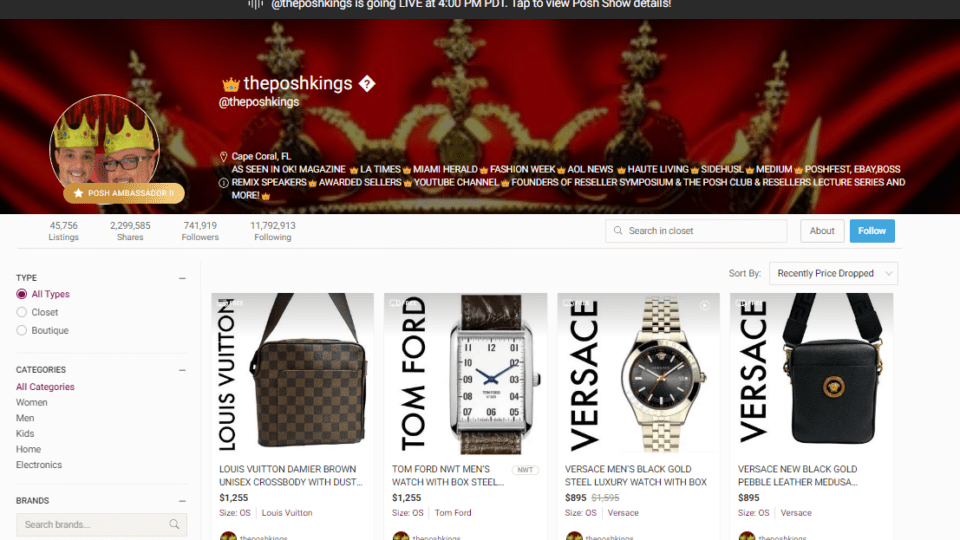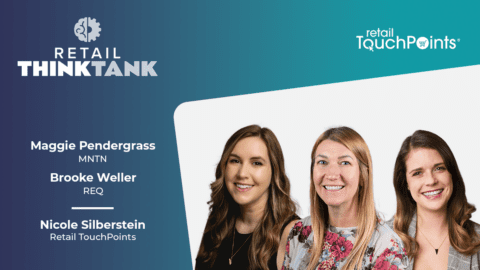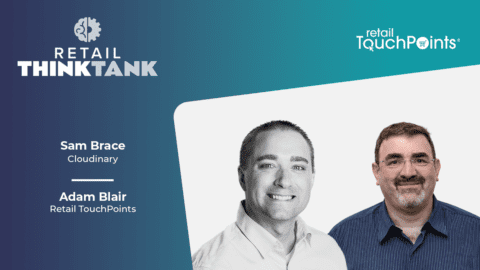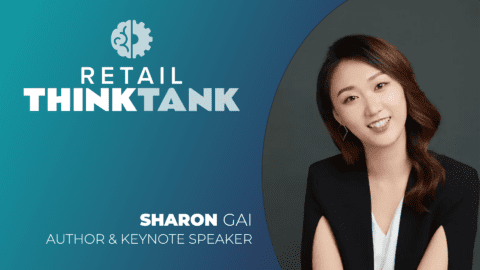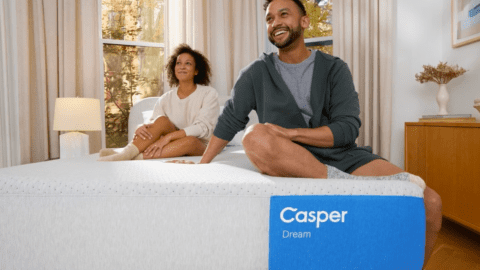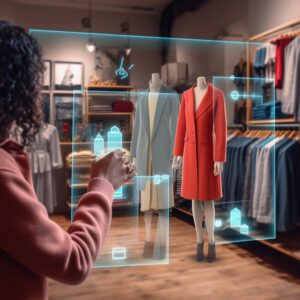Jon Anthony and Brad Schwibner are a married couple based in Florida, but these days they are more often known by their online moniker, “The Posh Kings.” They could just as easily be known as the Kings of Reinvention: Before they became resale royalty on Poshmark they ran a chain of men’s high-end fashion stores across the Sunshine State for nearly 20 years. And before that, Schwibner was a welder, Anthony a hairdresser.

The couple’s knack for adaptation, their undaunted willingness to jump into new challenges (and new businesses) and their outgoing, friendly attitudes make them a wellspring of knowledge about retail and entrepreneurship, one we willingly tapped for our series on successful small businesses. And they are a success — since launching their online resale business in 2014, the couple now fully supports themselves with the money they make selling goods online. Anthony and Schwibner sat down with Retail TouchPoints to share their insights on what it takes to succeed in online resale, and business in general, in today’s challenging economic environment.
Retail TouchPoints: So tell us how you became “The Posh Kings.”
Jon Anthony: [After closing our stores] we took some time off to take care of my mother, and we realized you have to do something, you can’t spend your days at home forever. We were watching a Sunday news program, and Poshmark came up. Back then everybody knew about Ebay, but Ebay was perceived as more for hard goods, and people really didn’t associate buying pre-owned with bags or garments or shoes. So we thought, why not give it a try?
Advertisement
We had so much stuff left over from the stores, and I also had oodles of luxury briefcases and high-end T-shirts to wear under a suit that weren’t really applicable to my life anymore; I didn’t foresee myself really needing my Louis Vuitton briefcase again.
In the early days Poshmark was only for women’s items, so we kind of, I wouldn’t say broke the rules, but we bent them — I said, “You know what? These can be unisex.” Brad and I are very fortunate now to be good friends with the executive board of Poshmark, so we laugh at it now, but we did break the rules in the beginning. So we put up a few things. We really didn’t anticipate anything happening, but we sold things immediately. The very first item was a Fendi watch that was new in the box from our stores. It sold I think within three hours of being listed.
The big realization we’ve had is that reselling can be monumental for people that either can’t or don’t want to have traditional lines of work. Poshmark in particular was definitely picked up by women initially who were retirees, stay-at-home moms or single moms. You didn’t have a lot of hobbyist sellers in the beginning; you had a lot of women that had a need for supplemental income.
In our situation we were in a catch-22 where we wanted to produce an income again, but we also wanted to give proper care to my mother in her time of need. We had a ton of stuff sitting at the house, which most people do. The average person has a ton of stuff in their homes that they no longer use — that is just money that’s sitting there. And what’s really exciting now, 10 years later, is how many people we knew in the beginning, especially a lot of gals who were struggling to keep a roof over their heads and put food in their children’s mouths, who are now making big money and living a wonderful life for themselves that they probably wouldn’t have had otherwise.
RTP: You both must have such an innate entrepreneurial spirit and sense of adventure to dive headfirst into these things, both your stores and now online resale.
Anthony: We try not to think about any of the drawbacks. When we come up with an idea, we just jump into it. And then we do go, “Oh shit. Now what do we have to do to make it happen?”
As we transitioned [to online resale] we did draw on our experience with the stores, especially during the holiday season. We started off selling all pre-owned and mostly pre-owned luxury online. But then we realized that, especially during the holiday season, even people who are firm believers in sustainability want to give a new item as a gift. So we found that we were really having a major lag in business during the holiday season when everybody else was making a ton of money. Now we’ve transitioned our own business to entry-level and contemporary new items, as well as pre-owned luxury.
Entry-level normally is something that we would choose to charge $15 and up for, and typically in reselling that means the item probably retails for at least $30 and up. Most people don’t turn to Poshmark, Mercari, Ebay to pay full price on anything. If that’s the case, they will go and enjoy the comforts of mainstream stores. With online selling in general, be it new or pre-owned, typically people are searching for value.
RTP: Since you started in online resale, a lot more people have joined the ecosystem, both buyers and sellers. Do you think it’s still possible for people to actually make a living doing this, and if so, what’s the key to scaling so that it can become your job and not just something you do on the side?
Anthony: The key is treating it like a job and a business, setting parameters — you get up in the morning and you work. Even if you only are able to dedicate two hours a day, structure those two hours and take it seriously. I think a lot of times if business is slow people get bored and they go sit on Instagram for three hours instead of maybe listing merchandise they have in their house
Brad Schwibner: Or — and we know a lot of people who did this, especially during COVID when people were out of a job and everyone started reselling — they find that it’s really fun to go “find the treasure,” so to say. But we ended up talking to several people where all they liked doing was the shopping part, so they would end up with tons of merchandise, like piles of clothes.
Anthony: There are resellers out there with thousands of items that aren’t listed, and they go buy more.
Schwibner: It’s fun to go shopping, but you’re not actually working, you’re just doing one important aspect of the job. Whereas we get to kill two birds with one stone. We love to shop ourselves, just like most people do, so we get to go out and shop, but then we sell it. Even when we buy stuff for ourselves, we’ll wear it and if we’re bored of it after we’re done, or we lose weight, gain weight, whatever, we resell it. We get the adrenaline fix off of being able to shop, but you still have to treat it like a job.
RTP: There are always some aspects of a job that aren’t fun. What are the less fun aspects about being a reseller?
Anthony: The slow times. Slow times are tough because it’s not like a traditional job where you have a guaranteed paycheck and your boss will pay you no matter how slow it is or isn’t. It is a little more nerve-wracking in that way, but that’s why resellers have to treat this as a business. If you make $20,000 one month that doesn’t mean you can spend all $20,000; you have to put some of it back into merchandise, you pay yourself a portion, and you also have to put some aside, because the next month could be slower.
RTP: You also have a YouTube channel now where you give people tips on becoming resellers, is that right?

Anthony: We do. We have a YouTube channel, and a lot of people have thanked us and told us it’s been a help to them, so we’ve enjoyed that. Also, we’re currently working on a new project to develop educational programs where we help people in crisis one on one, people that are having a hard time being gainfully employed. I think a lot of people have the tools to get some type of employment, but that employment doesn’t allow them the life that they need for themselves or their family. So we want to start an educational program, where we can help these people learn about reselling as something that could possibly go along with a more traditional job and help them find some relief.
RTP: Has the economic and sociopolitical environment impacted your business over the last couple of years?
Anthony: People are spending their money differently. As an example, and obviously there are exceptions, but if someone can afford a $20,000 Hermès bag, they’re going to Hermès to buy it — unless they want it for five grand, and then they’re searching for it pre-owned. Pre-owned has been pushed into two markets now — you have super-high-end resale, which is Hermès, Louis Vuitton, even Gucci, which isn’t as super-high-end as it used to be but it’s still in that level; or it’s value-based, and there you have to work the volume. For several months a year we personally have adapted to become volume sellers, so we take a small portion of each item, but we sell a lot of items and that’s where our income does well.
Interest rates are sky high, the price of food is astronomical, and housing and food you can’t say no to, you have to have it. But look, it’s still America; we like to collect things, so to speak. People still like to shop — good, bad or ugly, it makes them feel good. So people still want to shop, but they are feeling a little more heat, so they have to be a little more savvy with what they pay, and they’ll hold out until they get it for what they want.
RTP: Do you ever think about opening another physical store tied to the Posh Kings brand?
Anthony: We’ve tossed it around, but what really holds us back is that the overhead has just gotten out of control, the price of everything.
Schwibner: It’s not just rent, even the insurance is expensive, the telephone lines. It’s daunting.
Anthony: Online businesses of all sorts have really enabled people to take a little more control of their lives and their destiny through a business that they wouldn’t have been able to do otherwise. The cost of traditional storefronts is very high and you don’t have the flexibility. As an example, let’s say we do a bad buy, we buy 100 tops and nobody likes them. We have the ability, because our overhead is very controlled, to liquidate them quickly, get our money out and flip into something else. But if I’m paying $25,000 a month to rent a store and then you have employee salaries, I can only go so low, because I have to make X amount of dollars of profit; those fixed bills have to be paid. Whereas when you work out of your own home and you have a storage facility or whatever, the overhead is so low, you can [decide to sell things off] fast. Even if I don’t make a profit it’s not going to really hurt me, because I’m going to flip that into a better buy that I can make profit on. You can turn the direction of the ship much faster than in traditional retail.
RTP: Throughout your time in retail, both when you had your stores and now, what are the core truths that you have adhered to?
Anthony: Whether you’re selling something for $5 or $500, treat people well — every client matters; every dollar matters. Look at the dollar store and how much money they made in their day. People sometimes discount items of lesser value. In fact, there’s a lot of snobbery in this industry that you’re only a “real” reseller, so to speak, if you’re selling super expensive things. That’s not the case.
Schwibner: A sale is a sale. We’ve always focused a lot of our energy into the experience. Shopping has so many different things that make you feel good — the item you’re looking at, the store you’re in, the salesperson you’re working with.
Anthony: That’s what we’ve always done, and we continue to do. These days we do a lot with live selling, which enables you to show your personality and engage with people. We do a lot on the Poshmark app with live shows.
Schwibner: We’ve always focused our energy [on the people] and that’s why I think live-selling works so well for us. We’re able to give somebody online a whole experience that’s enjoyable. It’s not just them finding a great item. They’re getting to know us, they’re having fun.
Anthony: Which is something that has gotten lost — engagement is important and it’s so important to treat people well. When I was a hairdresser, the client who gave me a $1 tip would be treated just as well as the one who gave me a $100 tip. Every dollar matters, and that’s what I think gets lost in our society. Unless you’re spending a lot of money, you don’t get the same treatment. People that either choose to buy value or can only afford value are treated less than and get lower quality.




